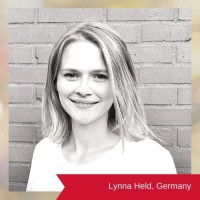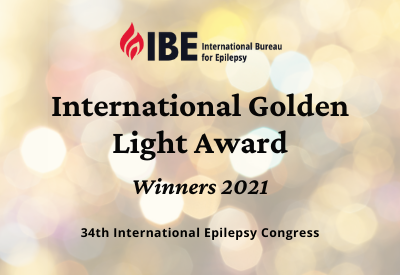Golden Lights at the 34th International Epilepsy Congress
The IBE Golden Light Awards are an opportunity to recognise and reward young people affected by epilepsy – either because they have epilepsy or have made a significant positive impact on the lives of others who have the condition. The aim is to show that people with epilepsy do not have to be defined by their epilepsy but who embrace the call of the International Bureau for Epilepsy to ‘bring epilepsy out of the shadows and into the light’.
This year 19 worthy candidates, nominated by their chapters, will be presented with their awards during the IBE Day at the 34th International Epilepsy Congress in September. By attending the virtual symposium, you will have the opportunity to hear them recount their remarkable stories and see them receive their award.
The IBE Day takes place on Wednesday, September 1st and you can find out more about the programme and how to register at: https://www.ibe-epilepsy.org/ibe-day-2021/


Lynna is a board member (Vorstandsmitglied) and secretary of Deutsche Epilepsievereinigung (DE). She is dedicated to the development of the self-help-group “Junge DE”, for younger members within Deutsche Epilepsievereinigung. Here she involves other young members in this work without splitting the organisation. The effects are absolutely positive: More young people than ever are getting involved in the acitivities of the DE and are confidently spreading their knowledge!
Read Lynna’s story here
Luiza was diagnosed with epilepsy four years ago. She has since been using her YouTube channel to reach out to other young people affected by the disease. Luiza is a member of the ABE (Brazilian Epilepsy Association) and now leads a youth group.
Luiza says “I want to say for the people with epilepsy: “be brave and fight for our rights.” My work teaches me a lot, not only about epilepsy, but about people, about life, but most of all, about how helping others, is always going to be the right way to live.”
Read Luiza’s story here
Meng-Leo has struggled through epilepsy diagnosis, drug dose adjustment and the recurrence of seizures after a seizure-free period in his early epilepsy journey. However, despite these difficulties, he has achieved great academic success and has proven himself to be a person with a positive attitude and indomitable spirit toward epilepsy. Meng-Leo is both a person with epilepsy and a physician training to be a neurologist. Despite a culture of social stigma around epilepsy in Taiwan, he gladly accepted the invitation to lead a six-member group of young adults with epilepsy as speakers at a national conference as part of the Taiwan State Party’s implementation of the UN Convention on the Rights of Persons with Disabilities, demonstrating excellent leadership skills. Read Meng-Leo’s story here
Dr. Mohan Dike joined the Epilepsy Association of Nigeria in July, 2016. Together with Dr S.E. Nwakwue he created a group for youth action against epilepsy which helps to raise awareness among young people and medical students and has since gone on to establish multiple epilepsy centres in his country.
Mohan has been involved in many presentations and support groups to make sure that epilepsy is pushed up the political agenda in Nigeria and in order to bring about change at government level.
Read Mohan’s story here
In 1997 Mohsen had a bone marrow transplant surgery- surgery which was fortunately successful. However, following the surgery Mohsen began having seizures. His physicians said the cause of the newly onset epilepsy was possibly a side effect of different medicines which were used for the bone marrow transplant surgery.
Mohsen is a Member of Institute of Public Law Studies, University of Tehran, a Member of Iranian Constitutional Rights Association and a Member of Iranian Association of Administrative Law.
Read Mohsen’s story here
Praise’s epilepsy originated as a result of falling and hitting her head at the age eighteen months. Praise describes the negative impact that epilepsy has had on her life and her mental health: “Epilepsy brought me low self-esteem, lack of confidence, stigmatization, abandonment, traumatization and demoralization a lot.” Through careful management, Praise has been able to turn this around. There has been a huge improvement in her seizure frequency and severity, and she is now studying English Modern Literature at university. Read Praise’s story here
Meet Sophie Nabukenya from Uganda, a volunteer with the Purple Bench Initiative.
“My dream is the whole world to understand that epilepsy is a disease like any other; people living with it are not bewitched, demon-possessed or insane. They can achieve every one of their goals if they seek and adhere to their medication, stop pity-parties,work hard and believe in themselves like I do.”
Read Sophie’s story here
When Valentina was a child, she had a rare kind of epilepsy, with an abnormal electroencephalogram and had seizures very often, sometimes many in the same day. With the support of her family and neurologist, Valentina’s began to have less seizures and by age 18 she had none at all. The experiences of her childhood paved the path towards her becoming a professional who could help children with motor problems due to neurological causes. Valentina has now been working as a neuro pediatric physiotherapist for more than 7 years. Read Valentina’s story here
Veselka Šoštarić, from Croatia, was diagnosed with epilepsy at 14. Sadly, in Croatia there was, and remains, a common misconception that epilepsy is a mental illness. Veselka experienced a lot of prejudice and stigma. Now 32, Veselka is married with three beautiful, intelligent and completely healthy children: a daughter and two sons. She explains “There are a lot of fears when starting a family when you are diagnosed with epilepsy. But in collaboration with a neurologist, I adjusted my medication during the family planning period, and with the help of a doctor, gave birth without significant problems.”
Read Veselka’s story here
Adi Vaknin-Aviram is an Israeli writer, bibliotherapist and a PhD doctorate in literature. Her first book, “Aura” was published last March. The book tells the story of Gabi, a young woman living with epilepsy. The story of Gabi was inspired by Adi’s own experience of epilepsy. She was diagnosed with epilepsy at 7 years old, with tonic clonic and absence seizures. Adi hopes her book will offer a personal point of view and raise awareness about the topic.
Read Adi’s story here
“Epilepsy was a big part of my life and I often felt misunderstood and unable to connect with others who could relate. This sparked my volunteering in the epilepsy community to help find other people who could relate to my experiences…
I use my platform and experiences living with epilepsy to help others. It took me years to connect with others living with epilepsy, so I frequently mentor others, so they don’t have the same experience I did. While I certainly didn’t choose my diagnosis, I am thankful it helped me find my calling.”
Read Alison’s story here
Bright M Bwalya is a 29 year old epilepsy and mental health advocate, poet, innovator and entrepreneur living with epilepsy. Bright was diagnosed in 2016, a year before finishing university. Multiple daily seizures placed a huge strain on his studies but as his dissertation Bright developed a mobile application for people with epilepsy or convulsive disorders and for the general public.
A passionate advocate, Bright explains, “Even if I am not cured, I am proud to have the strength and be a beam of light to those still in the dark about this condition, for them, I will be strong and be Bright.”
Read Bright’s story here
In 2008 Cassidy founded Purple Day, an epilepsy awareness day that is now celebrated globally every year on March 26th. Cassidy started Purple Day motivated by her own struggles with epilepsy and the discrimination and stigma that came with it. Her goal is to get people talking about epilepsy in an effort to dispel myths, reduce stigma and let those living with epilepsy know that they are not alone.
Read Cassidy’s story here
Emily is a young member in the Hong Kong Epilepsy Association. Emily has had epilepsy since her childhood. Epilepsy has been devastating for her both physically and psychologically. Her study and school life were affected adversely. Nevertheless, she has a motto to support herself and others: ‘Never give up’. Emily has now completed her academic pursuits with a diploma. She has demonstrated her perseverance in leading a positive life and is a great example for other people living with epilepsy.
Read Emily’s story here
Siew Tim is a mindfulness-based therapist under the Epilepsy Research Programme at the University Malaya Medical Center, Malaysia. During the process of history taking, Siew Tim utilised psychotherapeutic techniques and assessments to understand the needs of people with epilepsy (PWE). This allowed her to provide individualised interventions for PWE to relate to their diagnosis and learn to cope with stressful life events.
Siew Tim received an award from the ILAE Young Leadership Development program, and subsequently joined the Young Epilepsy Section. Read Lai’s story here
Oliver explains: “Like many people with epilepsy, I have had negative experiences associated with living with the condition but in so far as possible, I have used those experiences to try and help increase understanding and awareness. My participation in the 2020 International Epilepsy Day campaign was one such example of this.”
Read Oliver’s story here
fff
Vinay resides in New Delhi. He is an Ultra Randonneur, 4 Times Super Randonneur, a Marathoner and attempted Paris-Brest-Paris in 2019. In July 2005 Vinay was diagnosed with focal seizures due to a cyst in the left temporal region of his brain. This affected his lifestyle and daily routine in a massive way. Recently, Vinay spoke on a webinar conducted by Indian Epilepsy Society and become a member of epilepsy support group Ekatwam. Vinay is currently fund raising for the Child Raise Trust through participation in the Tata Mumbai Marathon 2021 which will be utilized for medicines for underprivileged children with epilepsy. Read Vinay’s story here
Camila Herzberg Cuetú is a young Cuban girl who has addressed epilepsy issues and made them visible through the arts, in a creative and transversal way. Camila is one of the founding members of the first group of teenagers with hemispherectomy on the social media, a tool that she applies to teach the techniques and resources she has acquired to live in our world with the use of one hand and just half a brain. Camila’s first book was published in 2013. To date, she has published 6 short stories and is currently working on another. Read Camila’s story here
Fred is the secretary of the National Epilepsy Coordination Committee in Kenya. He is inspired by his youngest sister Mercy Kwekwe Mboya, who was diagnosed with epilepsy at the age of 2 years following cerebral malaria. Fred is also a counselor and his background in theology has enabled him inspire and give hope to hundreds of youth living with epilepsy. Recently, Fred organized and participated in an Epilepsy Awareness Challenge involving a 3 day, 327km cycle and climbing Mt. Kilimanjaro. Read Fred’s story here

